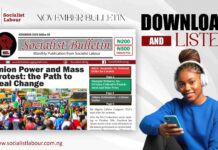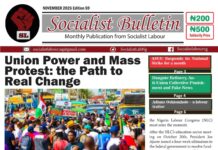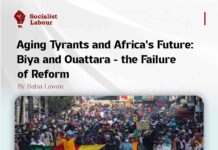By Biodun Olamosu
The issue of insecurity is one of the major problems confronting working people and has been a focus of attention of intellectual discourse today more than ever before. There is a consensus on this issue that lives are not safe as more people get killed by various means, other than natural causes, either by armed banditry, human rituals, auto accidents, aeroplane accidents, political assassinations, herders, cattle rustlers. The latest being the act of kidnapping only to be released after paying ransom that runs into hundreds of millions of naira by victims or members of his/her family. Some of these events were earlier associated with the Niger Delta militants and later by Boko Haram insurgents, cattle rustlers and other lumpen elements. Not a few have also lost their lives through ill health including COVID-19, malaria fever, HIV/AIDS, cancer, kidney, hearth diseases, etc.
Property and investment are equally not safe. We have a situation recently whereby all the banks in a state were forced to close down because of the threat by the armed banditry. Many banks have been victims of criminal activities operating in the day time and night. Foreigners known for carrying investment portfolios have been marked as target of attack by such criminals. This was especially in the oil and gas sector and oil producing states of South-South.
Constitutional Framework
These are the security challenges confronting both nationals and foreigners. Any nation that strives for economic development is assumed to have resolved certain fundamental issues such as security, well-grounded political structures and infrastructures.
The 1999 Constitution of the Federal Republic of Nigeria made adequate provision for safety of lives and property. For example, Section 33(1) states that: “Every person has a right to life, and no one shall be deprived intentionally of his life…” while Section 43 pointed out that: “Every citizen of Nigeria shall have the right to acquire and own immovable property anywhere in Nigeria”
These constitutional provisions are fundamental because the essence of governance should be the welfare of the citizenry to live and enjoy a better living standard to enhance productive activities and reproduction for the public good.
The Way Society is Organised
Property which economists refer to as capital for the production of goods in distinction from property for personal use as consumables; becomes imperative for any society in order to create wealth and further wealth for the purpose of meeting the societal needs and welfare.
More often than not, the way society is being organised and governed best determine the conception of life, property, investment, safety, security, ownership of property, reward system, social welfare and public good, etc.
It is important to observe that a society that is driven by private ownership of property tends to be biased towards individualism and pursuant of interest eschewed in favour of only few people that owns the means of production. People that have abundant resources within their control are bound to have greater influence over other spheres of human life including political power.
It has been argued that such huge resources, at the disposal of the few elite, did not come from their personal achievements or efforts. They usually arise from inheritance from their parent’s, forefathers or spouses. These, in turn, are usually rooted in property relations of exploitation, government patronage or looting. Even if the original accumulator of such resources can said to be hard working, this cannot be said of the inheritors that indulge in a life of perpetual indolence but nevertheless engage in political influence because of the resources at their disposal.
Socio-Economic System
The current economic system allows a few rich people to accumulate so much at the expense of the majority wallowing in poverty. This provides the basis for much insecurity in society.
Many of the problems associated with insecurity in society include the dearth of opportunities for the greater percentage of the population. These have been responsible for the vicious cycle of poverty. This is the very reason people are found living in shacks, huts, ghettos on one side of the road, while few others are living like the Biblical heavenly palaces, laced and constructed with gold, silver and diamonds on the other.
It would be recalled for instance that the welfare programme in Nigeria in the 1950’s/1960’s included the introduction of free and compulsory education at the primary school level, award of scholarships to pursue higher education in foreign countries brought about social mobility to many families that were able to break away from the shackles of poverty that was hitherto their lot. These educational programmes produced many professors, some of whom would have ended up as palm-wine tappers. This was how the well-known Professor of Economics, Sam Aluko, described what was likely to be his lot, if not for the opportunity of having education.
Reward System
One other area that calls for discussion is the issue of the reward system. The question to ask is: how do we fare in rewarding deserved achievers? Is reward actually on merit? The irony of this in a class society is that the wrong people are being rewarded, while people that want to depend on merit are side-tracked. The system for the rich and by the rich embraced right away from the colonial period still persists today. The situation at the expense of the poor has not changed sixty years after independence.
As pointed out above, private ownership of property encourages individualism and fosters profit and interest for the few. Such a system has been defended for bringing about competition and encouraging hard work, but it encourages the winner takes it all syndrome. This has gone a long way to influence others along the path to get rich by all means possible, however immoral or illegal.
The politicians therefore engaged in ballot box snatching, votes buying, tampering with electoral results and other forms of electoral manipulations so as to win elections by fair means or foul and get rich quickly. Electoral manipulation is injurious to the fundamental right to personal life. Rightful winning candidates are prevented from winning elections and electorates are deprived of the best programme capable of ameliorating their suffering.
Lives of the people are involved in the course of such deprivation as those that come to power by foul means usually do not appreciate the value of such a political mandate. Also lives are not safe in the hands of such manipulators that involve political thugs or touts in carrying out their nefarious political activities.
Neo-Liberal Policy Offensive in the 21st Century
In the late 1980’s, many governments embraced neo-liberal policies that were initiated by USA, China, Chile and Britain. This policy plank, that the IMF and World Bank widely advocated and defended, was to further extend exploitative economic relationships across the globe. Some governments that did not want to embrace the policy were blacklisted. For other governments, the debt trap was used to put them to check. This way of exerting pressure by these powerful institutions was meant to maximize the economic interests of the few multinational corporations and the local individual business persons. The result of such relationship has been huge capital flight from the poor nations to the developed countries. Research also confirmed that while the average standard of living has drastically reduced in the Global South as a result of such relationship, the profits that accrued to the multinationals and the local elites have never been higher in recorded economic history since after the 2nd World War (1945).
Since economics is the base of all superstructures, it stands to reason that the source of security or insecurity in any society could best be sought in her economics. It is therefore not fortuitous that despite significant revenue being generated from oil in Nigeria, the situation of Niger Delta people on whose land, crude oil is being exploited, has been that of neglect. This therefore generated a high level of insecurity. The people of Niger Delta collectively rose to demand for the development of the area that lays the golden egg, they agitated for 33 per cent of the share of the total oil revenue.
Much concession has been made in this regard, but we are yet to see the results of this in physical development. Resources were allocated to the area in the budgets by federal, states and local governments are not reflected in the living standard of the common people. Oil producing states benefit from huge incomes, but this is either looted or used to benefit a few individuals in the state capitals.
What is the Way Out?
It has been established that the system of governance is eschewed in the best interests of the few elite that dominate the economy. The majority find themselves wallowing in poverty.
The poor that take to crime in order to fight the system are only looking for an escape route. This individualistic perspective comes from the ruling elite. They are responsible for the situation of the poor. That is the state of their poverty, as a result of the exploitation and oppression they are daily subjected to.
The state being the coercive force to defend the interest of the ruling class are all out to criminalise deviant roles by individuals that are out against the social order of the society. They are not only brutalised, alienated, arrested, detained, jailed, annihilated, maimed, isolated and killed but they are also fought philosophically and ideologically by the whole forces of arm and security agencies descending on them by way of the government’s might and its ideological machinery. This includes the press, religious, cultural and educational institutions as means of disseminating the ideology of the ruling class. This is designed to attract sympathy to themselves, as opposed to the victims of the system. The victims of poverty are blamed for their state and their reaction to it.
The working people that are also at the receiving end of the policies of the government and the elites have an important role to play in these circumstances. They should organise themselves as formidable forces to counter the ruling class agenda and provide an alternative policy to that of the government, the executive arm of the exploiting class. It is when this is done that taking to crime will not be considered a realistic alternative. This is the position that trade unions are supposed to take. This needs to be extended to other poor strata in society that are not organised properly under a broad platform that would embrace trade unions and civil society groups.
The essence of such an alternative platform cannot be for the purpose of maintaining the existing social order for the elite. It needs to negate such a social order that is responsible for the production of crime and criminalities in society. We need to organise collectively to emancipate the poor and uproot them from their position of poverty. They should become participants in the building of a society that will be free of exploitation and oppression; where opportunities abound to develop everyone’s potentials to the fullest. In such situation, popular democracy should be the focus and the attitudes of citizens are bound to change to that of enhancing creativity and productivity from the lower strata in society to the upper strata.
Conclusion
Safety of lives, property and prosperity can therefore only be attained on a permanent basis by the mobilisation of oppressed people to build a society along socialist lines where they would be recognised as equal participants.
The first step is a united campaign led by the trade unions, but supported by the market women, okada drivers and wider informal sector for a decent minimum wage. This would immediately lift millions of workers and their families out of poverty and allow them to spend more in the markets. This would then benefit the mass of informal workers.






